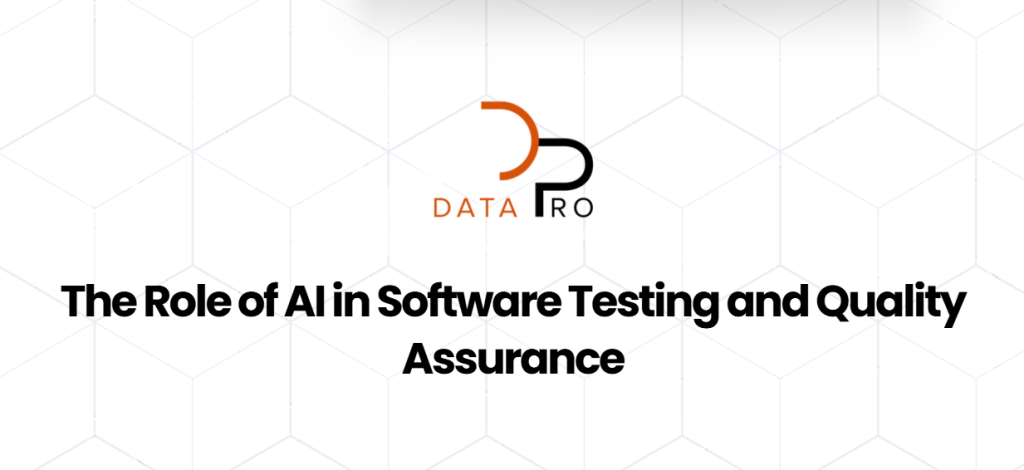
The Role of AI in Software Testing and Quality Assurance
The software development lifecycle has undergone a significant transformation with the integration of Artificial Intelligence (AI) in Quality Assurance (QA) and Software Testing. AI-driven testing methodologies have not only increased efficiency but also enhanced the accuracy and scope of testing processes. Traditional software testing, which relied on manual interventions, was often time-consuming and prone to human error. Today, AI-powered tools offer automation, predictive analysis, and self-learning capabilities that allow QA teams to optimize software testing with greater precision and effectiveness.
This article explores the in-depth role of AI in software testing, examining its applications, benefits, and future impact on the industry. By leveraging AI, organizations can improve test coverage, reduce maintenance efforts, and accelerate software releases, ensuring high-quality applications that meet evolving user expectations.
Understanding Quality Assurance and AI’s Impact
Quality Assurance (QA) is a structured process aimed at ensuring that software products meet predefined quality standards. Traditionally, QA relied heavily on manual and scripted testing, which involved extensive human intervention. While these methods ensured software reliability, they were not scalable for modern, agile, and DevOps-driven environments where continuous integration and deployment (CI/CD) are the norm.
AI has revolutionized QA by introducing automation, self-healing test scripts, predictive analytics, and intelligent bug detection. By analyzing historical test data and learning from patterns, AI enhances software testing efficiency, improves defect detection rates, and significantly reduces human effort.
Key Applications of AI in Software Testing
1. Test Automation with AI
AI-powered automation tools streamline the execution of repetitive testing tasks, improving efficiency while reducing manual effort. Unlike traditional automation tools, AI-driven solutions continuously adapt to changes in software, reducing maintenance costs.
- Intelligent Test Case Generation: AI analyzes historical test data and user behavior to generate test cases dynamically.
- Self-Healing Test Scripts: AI detects changes in UI elements and updates test scripts accordingly, reducing script maintenance efforts.
- Smart Element Recognition: AI identifies and interacts with UI components even when their properties change, improving test resilience.
2. Enhanced Test Coverage and Dynamic Test Case Generation
AI expands test coverage by identifying edge cases and generating dynamic test scenarios.
- Data-Driven Testing: AI analyzes large datasets to generate diverse test cases.
- Exploratory Testing: AI-based bots autonomously explore the application and identify defects that might be missed in traditional testing.
- User Behavior Simulation: AI mimics user interactions to test various workflows and usability aspects of software applications.
3. AI for Defect Prediction and Prevention
One of AI’s most valuable contributions to software testing is its ability to predict potential defects before they occur.
- Code Analysis: AI analyzes source code to identify areas with high defect potential.
- Risk-Based Testing: AI prioritizes high-risk test scenarios based on historical defect patterns.
- Proactive Bug Detection: AI-driven tools monitor system performance and detect anomalies in real-time, reducing downtime and improving software reliability.
4. Natural Language Processing (NLP) in QA
NLP-powered AI tools enhance software testing by analyzing textual data, such as documentation, user feedback, and test scripts.
- Automated Test Script Generation: AI converts natural language test scenarios into executable test scripts.
- Sentiment Analysis for Bug Reports: AI evaluates user-reported bugs and categorizes them based on severity and priority.
- Compliance Testing: AI reviews software documentation to ensure adherence to regulatory standards and guidelines.
5. Performance and Load Testing with AI
AI-driven performance testing tools simulate real-world user loads and identify system bottlenecks more efficiently than traditional testing methods.
- Predictive Performance Analysis: AI anticipates system failures based on historical data.
- Anomaly Detection: AI identifies performance degradation trends before they impact users.
- Scalability Testing: AI optimizes load distribution and evaluates system performance under extreme conditions.
6. AI-Powered Self-Healing Test Systems
Self-healing AI systems automatically detect and recover from test failures, minimizing disruptions.
- Automated Issue Resolution: AI diagnoses failures and applies corrective actions.
- Adaptive Learning Mechanisms: AI continuously improves testing strategies based on past outcomes.
- Failure Pattern Recognition: AI identifies recurring failure patterns and suggests fixes proactively.
Popular AI Tools for Software Testing
Several AI-powered tools are revolutionizing software testing by offering intelligent automation, real-time analysis, and predictive capabilities.
- Testim: AI-based automation platform with self-healing tests and dynamic test data generation.
- Mabl: Intelligent test automation with self-maintaining test scripts.
- Applitools: AI-powered visual testing to detect UI inconsistencies.
- Test.ai: Uses computer vision and ML to automate UI testing.
- Selenium with AI Extensions: Enhances Selenium automation with AI-driven capabilities for intelligent element recognition and test optimization.
Future Trends in AI-Driven Software Testing
As AI continues to evolve, its role in software testing will become even more prominent. Emerging trends include:
- AI-Augmented DevOps: Integration of AI-driven QA into DevOps pipelines for real-time testing and monitoring.
- Hyperautomation in QA: Combining AI, ML, and RPA (Robotic Process Automation) to create fully automated testing workflows.
- Autonomous Testing: AI-powered bots conducting tests independently with minimal human intervention.
- Quantum Computing in Testing: Leveraging quantum AI to perform complex test computations beyond traditional computing limits.
Organizations investing in AI-driven QA strategies will gain a competitive advantage by reducing time-to-market, improving software reliability, and optimizing testing efforts.
Challenges and Considerations in AI Testing
Despite its numerous advantages, AI-driven testing comes with challenges that organizations must address:
- Initial Implementation Costs: AI-powered tools require investment in training and infrastructure.
- Skill Gap: QA teams must upskill to leverage AI-driven testing effectively.
- Data Privacy and Security: AI algorithms must comply with strict security protocols when handling sensitive data.
- False Positives and Over-Reliance on AI: AI may generate false positives, requiring human intervention for validation.
By overcoming these challenges, organizations can maximize the benefits of AI in software testing while ensuring high-quality software releases.
Conclusion
The role of AI in software testing and quality assurance is undeniable. AI-powered testing tools enable organizations to automate processes, predict defects, optimize performance, and enhance overall software quality. As technology advances, AI will continue to play an integral role in shaping the future of software testing by introducing intelligent automation, self-learning test systems, and proactive defect prevention.
Organizations embracing AI-driven QA methodologies will experience faster software releases, improved efficiency, and a competitive edge in the digital landscape. By integrating AI-powered tools and adopting AI-enhanced testing strategies, businesses can ensure robust, high-performing, and reliable software products that meet modern user expectations.
In the rapidly evolving tech industry, staying ahead in QA means leveraging AI’s full potential. Companies that invest in AI-driven testing will not only improve software quality but also redefine industry standards for efficiency and innovation in quality assurance.
Innovate With Custom AI Solution
- 12 Courtyard Pl,
Lexington, MA 02420 - (617)319-0174
- corp@dataprocorp.tech
